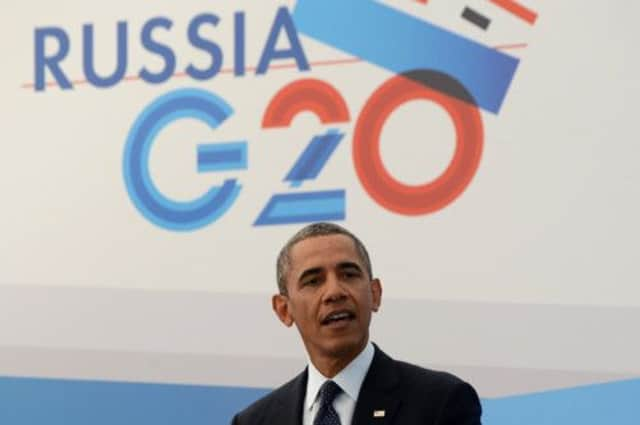Barack Obama: Leaders see need for Syria action


With the US Congress now showing signs of reluctance to back a resolution authorising military strikes, Mr Obama yesterday refused to say if he would act if he fails to win that approval.
Members of Congress say they are concerned even limited military strikes in Syria could draw the US into a prolonged war and spark broader hostilities in the region. A Senate debate will begin next week.
Advertisement
Hide AdAdvertisement
Hide AdMr Obama laid out in new detail his reasoning for seeking US Congressional approval, saying it was because the use of chemical weapons in Syria did not pose an imminent threat to the US or its allies – situations in which he said he would have responded immediately.
But he said the use of weapons of mass destruction is a long-term threat to the US and the world, and the US has the ability to respond with air strikes without the risk of putting troops on the ground.
“It’s conceivable, at the end of the day, I don’t persuade a majority of the American people that it’s the right thing to do,” Mr Obama acknowledged. “And then each member of Congress is going to have to decide.”
Mr Obama told reporters at the end of a two-day G20 economic summit that he and other leaders had had a “full airing of views on the issue”. He said many foreign nations will be issuing statements on their positions, but he did not say whether any specifically had joined France in supporting his move toward US military strikes.
Meanwhile, French president Francois Hollande said his country would await conclusions by UN inspectors investigating the 21 August chemical weapons attack in Syria before deciding on any action, further delaying the chance of strikes until the end of the month at the earliest.
UN diplomats have said the results of the UN analysis may not be ready for weeks.
Speaking in St Petersburg, Mr Obama said most leaders believed that chemical weapons were used in Syria and that international “norms” against that use must be maintained. He said division came over how to proceed through the UN.
Mr Obama also held a surprise meeting with Russian president Vladimir Putin, a chief opponent of US military action. Mr Putin, a staunch ally of Syrian president Bashar al-Assad, said the discussion with Mr Obama focused on Syria over 20 to 30 minutes and that, while they disagreed, the meeting was “substantial and constructive”.
Advertisement
Hide AdAdvertisement
Hide AdMr Obama said he had a “candid and constructive conversation” with Mr Putin, even if they disagreed on how to respond to chemical weapons in Syria. He said they agreed the underlying conflict could only be resolved through a political transition.
Mr Putin restated his opposition to any strike, saying it would destabilise the region. And he said he believed a majority of the populations in countries supporting military action were against it.
The Russian president said: “The use of force on a sovereign state is only possible if it is done for self-defence, and, as we know, Syria is not attacking the US, or under a decision made by the UN Security Council. As one participant in our discussion said, those who act otherwise put themselves outside of law”.
Mr Putin has alleged last month’s chemical attack could have been carried out by opponents of the Assad regime, saying it was a provocation, and suggested that a punitive US military strike on the country would harm the global economy and stifle growth.
Pope Francis weighed in on the ongoing debate over possible military action, urging leaders gathered at the G20 to abandon what he called a “futile mission”.
Later, David Cameron acknowledged that international opinion was divided on Syria. “This summit was never going to reach agreement,” he said, but added the case made by Mr Obama “was extremely powerful”.